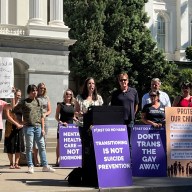 Dr. Susan Love, breast cancer survivor, activist and researcher.
Dr. Susan Love, breast cancer survivor, activist and researcher.
Dr. Susan Love has been on both sides of the examining table: In 2012, the chief visionary officer of the Dr. Susan Love Research Foundation — which works to eradicate breast cancer with new research approaches — was diagnosed with leukemia. Her cancer is now in remission, but her fight’s not over.
Dr. Love’s foundation is behind the Health of Women study, which polls all types of women for clues into what leads to breast cancer and how we can end it. Participants complete lifestyle surveys a few times a year, providing valuable data to Dr. Love’s team of researchers. “We need everybody, because we need to compare,” she tells us. “It can contribute to our understanding and pushing research.”
Because Dr. Love and her team work to eliminate the disease, we spoke to her about what exactly we need to do to get there.
Are we at all close to winning this war?
No. [Laughs] I don’t think we’re as close as we would like to be. We’re still treating with surgery, radiation, chemotherapy, sometimes targeted drugs — we started that when I started out in the early 1980s. We keep adding drugs, but we don’t ever subtract anything, and our results are a little better, but not great. What I really think we need to do is shift from trying to find exactly what is the gene that’s gone wrong, or the metabolic pathway that’s gone wrong, and fix it, to trying to figure out what are the conditions that cause it in the first place. I think we’ll be much more successful if we go looking for the cause rather than focusing on fixing it after it’s already broken. We have that great example of cancer of the cervix, where we were doing total hysterectomies for abnormal pap smears when I started because we didn’t know what else to do. So you lost your fertility, and had surgery for something that hadn’t even gotten far. It’s sort of like what we do for DCIS [abnormal cells in a breast’s milk duct] today. These mastectomies for DCIS, it’s like doing a hysterectomy for an abnormal pap smear — we don’t know what else to do. Then we figured out that it was sexually transmitted that it was a virus and now we have a vaccine. How much better would that type of approach be for cancer of the breast!
Why is that approach better?
All cancers have mutations in them, but we make lots of mutations in our bodies over the years. We’re exposed to carcinogens all the time — from the radiation in the atmosphere through environmental things, through the sun, through cigarettes — and the reason cancer is more common as you get older is because the longer you live the more chance you have to experience all of these carcinogens and get mutations. But not everybody gets cancer, so it obviously is more than just an abnormal mutation that’s the problem. If you think about, say, kids that grow up in a bad neighborhood, you can either try to capture every kid as they do a crime and put them in jail, or you can look at the conditions of the neighborhood and maybe you clean up, get rid of the gangs, get a farmers market, do all these things we talk about. By changing the neighborhood, [those] same kids will turn out differently — not 100 percent, but a lot.
So what needs to be done?
One of the things that we’re doing here at the Dr. Susan Love Research Foundation is putting out the call for people to give us questions to ask in the Health of Women study about the collateral damage [breast cancer] creates. I think [with] people who haven’t had breast cancer, there is a sense that, “Oh, well, you get diagnosed, then you have to have surgery and maybe radiation and chemo, but then you’re back to normal and everything’s great.” And anybody who’s had it will say no. [Laughs] You’re never back to normal — it’s a different reality. … So we’re putting out a call for questions and we’re gonna work with other breast cancer groups this October. Then we’ll put it in the health study and we’ll be able to document what the cost of the cure is and also maybe correlate it with some other things in people’s health. There may be links that haven’t been really looked at because people don’t pay that much attention to them.
What can we do to help?
We really need your generation to help push. We’ve got awareness, we’ve got screening, we have treatments — they’re not great, but we’ve got some treatments and we’re doing better — but let’s just get rid of it. To hell with it! The time’s come to go the next step. Let’s just end it — let’s find the cause and end it. And it’s a doable thing. We’ve done it with other cancers, we can do it with this.















